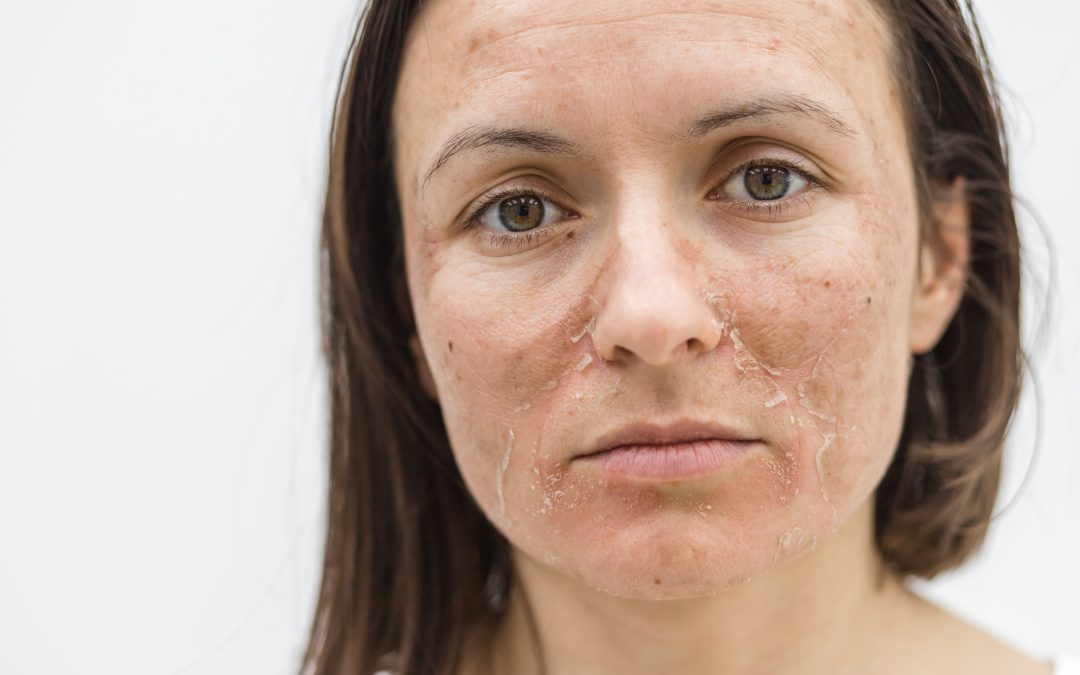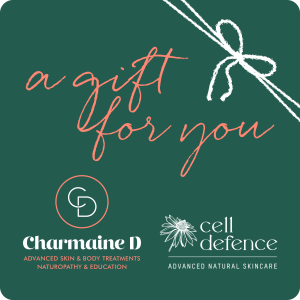The skin has a natural barrier function that helps to retain moisture and protect against external irritants. This barrier is formed by various components, including the stratum corneum (the outermost layer of the epidermis), tight junctions between skin cells, and structures called desmosomes and hemidesmosomes that help to anchor cells together.
Several factors can disrupt this barrier and lead to increased trans-epidermal water loss (TEWL).
When the skin’s barrier is compromised, it loses its ability to retain moisturise effectively. This leads to increased TEWL, where water evaporates from the skin surface more rapidly. As a result, the skin becomes dehydrated, dry, and more prone to irritation and inflammation.
To prevent excessive TEWL and maintain skin hydration, it’s important to support the skin’s barrier function. This can be done by using gentle cleansers, avoiding over-exfoliation, protecting the skin from harsh environmental conditions, and using moisturisers that contain humectants, emollients, and occlusives to help lock in moisture and prevent water loss. Additionally, incorporating a healthy lifestyle, including a balanced diet, adequate hydration, and avoiding smoking and excessive alcohol consumption, can also contribute to maintaining a healthy skin barrier.
Water plays a vital role in maintaining skin health and ensuring the homeostasis of the skin. Adequate hydration is essential for maintaining the integrity, elasticity, and overall appearance of the skin.
The skin is the largest organ in the body and serves as a protective barrier against external environmental factors. Water is crucial for maintaining the proper function of this barrier. It helps to keep the skin hydrated, supple, and plump, which contributes to a healthy and youthful appearance.
To understand the water requirements for skin health, it’s important to consider both external and internal factors that can influence hydration and dehydration of the skin.
External factors that can lead to dehydration of the skin include:
- Environmental conditions: Exposure to dry air, low humidity, or extreme temperatures can cause moisture to evaporate from the skin, leading to dehydration.
- Sun exposure: Prolonged exposure to the sun’s ultraviolet (UV) rays can damage the skin’s natural barrier and increase water loss, resulting in dryness and dehydration.
- Harsh chemicals: Frequent use of harsh soaps, detergents, or skincare products containing alcohol can strip the skin of its natural oils, leading to dryness and dehydration.
Internal factors that can affect skin hydration include:
- Age: As we age, the skin’s ability to retain moisture decreases, making it more prone to dryness and dehydration. It is particularly important for older individuals to ensure adequate hydration.
- Diet and nutrition: A balanced diet that includes foods rich in water content, such as fruits and vegetables, can contribute to overall hydration. On the other hand, a diet lacking in water-rich foods or excessive consumption of dehydrating substances like caffeine or alcohol can lead to skin dehydration.
- Health conditions: Certain medical conditions, such as diabetes or eczema, can impair the skin’s ability to retain moisture, resulting in dry and dehydrated skin.
- Skin disorders: Certain skin conditions, such as atopic dermatitis (eczema) or psoriasis, can impair the skin’s barrier function. In these conditions, the skin’s protective barrier is compromised, making it more susceptible to TEWL and external irritants.
To maintain skin health and protect against dehydration, it is recommended to drink an adequate amount of water daily. While the exact water requirements can vary depending on factors such as age, sex, climate, and activity level, a general guideline is to consume at least 1.9 litres of water per day. However, individual needs may vary, and it’s important to listen to your body’s thirst signals and drink more if necessary.

In addition to drinking water, there are other ways to support skin hydration:
- Use moisturisers: Apply hydrating skincare products that contain humectants, emollients, and occlusives to lock in moisture and prevent water loss from the skin.
- Protect against sun damage: Use sunscreen with a high SPF and seek shade during peak sun hours to minimise the damaging effects of UV rays on the skin’s hydration.
- Avoid hot showers: Excessive hot water can strip the skin of its natural oils and contribute to dehydration. Opt for lukewarm showers or baths instead.
- Humidify the air: Use a humidifier, especially during dry seasons or in environments with low humidity, to add moisture to the air and prevent excessive evaporation from the skin.
In conclusion, water is crucial for maintaining skin health and the homeostasis of the skin. Adequate hydration, both internally through drinking water and externally through skincare practices, helps to keep the skin moisturised, supple, and protected against dehydration caused by external and internal influences.
So when using moisturisers, humectants are ingredients that attract and retain moisture from the environment and the deeper layers of the skin. They help to hydrate the skin by increasing its water content. Examples of humectants include hyaluronic acid, glycerin, and sorbitol. Humectants are generally non-comedogenic and safe to use on acne-prone skin.
Humectants
When it comes to trans-epidermal water loss (TEWL) and organic ingredients, humectants play a significant role in hydrating the skin and minimising water loss. Organic humectants are derived from natural sources and can be beneficial for maintaining skin hydration.
Here are some examples of organic humectants commonly used in skincare:
- Hyaluronic acid: Hyaluronic acid is a naturally occurring substance in the skin that has the ability to attract and hold a significant amount of water. It has a lightweight, gel-like texture and is highly effective in retaining moisture, helping to improve skin hydration and plumpness. Organic hyaluronic acid is derived from natural sources, such as plant-based fermentation or bio-fermentation.
- Glycerin: also known as glycerol, is a humectant widely used in skincare products. It has excellent water-binding properties and helps to attract moisture from the environment to the skin. Organic glycerin is derived from vegetable oils, typically palm or coconut oil, through a process called saponification. It is considered safe, gentle, and suitable for various skin types.
- Sorbitol: Sorbitol is a naturally occurring sugar alcohol derived from fruits and berries. It has humectant properties that help to draw moisture to the skin and enhance hydration. Organic sorbitol is obtained through the fermentation of organic raw materials, ensuring a natural and sustainable source for skincare formulations.
Organic humectants not only provide hydration to the skin but also offer the advantage of being derived from natural and sustainable sources. They are generally well-tolerated by different skin types, including acne-prone skin, as they do not typically clog pores or contribute to breakouts.
When using organic humectants to combat TEWL and improve skin hydration, it’s important to consider the formulation of the product as a whole. Look for skincare products that combine organic humectants with other nourishing and supporting ingredients, such as natural oils, botanical extracts, and antioxidants. This can create a synergistic effect, enhancing the overall hydration and health of the skin.
It’s worth noting that while organic humectants can effectively attract moisture to the skin, they work best when used in conjunction with other moisturising ingredients, such as emollients and occlusives, to lock in that moisture and prevent water loss.
By incorporating skincare products with organic humectants, you can promote and maintain optimal hydration in the skin, helping to improve its overall health, elasticity, and appearance.
Emollients
Emollients are moisturising ingredients that help to soften and smooth the skin’s surface by filling in the gaps between skin cells. They form a protective barrier that helps to reduce water loss and keep the skin hydrated. Common emollients include plant oils, shea butter, and ceramides. Emollients are also generally non-comedogenic and suitable for acne-prone skin.
When it comes to emollients, there are organic options available that can provide hydration and nourishment to the skin. Organic emollients are derived from natural and organic sources, often free from synthetic chemicals and additives. These ingredients offer a more sustainable and eco-friendly approach to skincare.
Here are some examples of bio-organic emollients commonly used in skincare:
- Plant oils: organic plant oils, such as jojoba oil, argan oil, rosehip oil, and coconut oil, are rich in fatty acids and vitamins that help to replenish the skin’s lipid barrier. These oils have emollient properties, providing a smooth and soft texture to the skin while helping to reduce water loss.
- Shea butter: Derived from the nuts of the shea tree, shea butter is a organic emollient known for its exceptional moisturising properties. It is rich in fatty acids, vitamins, and antioxidants, which help to nourish and protect the skin. Shea butter absorbs easily into the skin, leaving it hydrated and supple.
- Ceramides: Ceramides are naturally occurring lipids found in the skin’s outermost layer. They play a vital role in maintaining the skin’s moisture barrier. Organic skincare products may contain ceramides derived from plant sources, such as wheat germ or rice bran, to provide additional hydration and support the skin’s barrier function.
Organic emollients are generally well-tolerated by the skin, making them suitable for acne-prone skin. They are less likely to clog pores or cause breakouts compared to some synthetic emollients. However, it’s important to note that individual skin sensitivity can vary, and what works for one person may not work for another. It’s always recommended to patch-test new products on a small area of the skin before applying them to the entire face.
Overall, incorporating organic emollients into your skincare routine can offer a gentle and nourishing approach to hydrating the skin, particularly for individuals with acne-prone skin who may be more cautious about potential comedogenic ingredients.
Occlusives
Occlusives are ingredients that create a physical barrier on the skin’s surface, preventing trans-epidermal water loss (TEWL) and locking in moisture. They are typically heavier and more occlusive than emollients. Common occlusive ingredients include petrolatum, mineral oil, and silicones. These 3 products are not recommended for any skin condition within Charmaine D’s clinic.
Whilst occlusives can effectively hydrate the skin, they have the potential to clog pores and cause acne breakouts in some individuals, especially those with oily or acne-prone skin. They can also cause the skin to not desquamate correctly and skin can look very wrinkled and become thicker to look at.
Regarding the use of occlusives on acne-prone skin, it’s important to note that everyone’s skin is different, and what works for one person may not work for another. Some individuals with acne-prone skin may find that occlusive ingredients exacerbate their acne by trapping sebum, bacteria, and dead skin cells, leading to clogged pores and breakouts.
In such cases, using organic and non-invasive ingredients can be a good alternative to keep the skin hydrated. These types of ingredients often focus on gentle hydration without the heavy occlusive properties. Look for moisturisers that contain a combination of humectants and lightweight emollients, such as aloe vera, cucumber extract, or jojoba oil. These ingredients can provide hydration without weighing down the skin or potentially causing breakouts.
Ultimately, it’s essential to listen to your skin and observe how it responds to different moisturising products. If occlusives work well for you and do not contribute to acne breakouts, they can be beneficial for locking in moisture. However, if you find that occlusives worsen your acne, it may be better to explore alternative moisturisers that are formulated with non-comedogenic ingredients.
Charmaine D, our naturopath, is here for you and is committed to helping you move through your ailments and forward into the rest of your life.
Book in for a free 30 minute skincare consult and see how she can help you!
Cell Defence by CD
Cell Defence is a revolutionary natural skincare system formulated by Naturopath Charmaine D. Discover our range of pure, potent plant stem cell serums, moisturisers & cleansers. Proudly made in Australia.
Follow us on Social
Quick Links
Customer Care
Contact Us
VISIT:
60A Broadway, Glenelg South SA 5045
PHONE:
0407 077 134
EMAIL:
info@celldefence.com.au
Copyright © 2022 Cell Defence by CD | Site by AVIDA Creative




